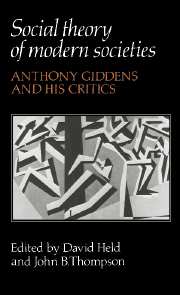Book contents
- Frontmatter
- Contents
- List of contributors
- List of abbreviations
- Editors' introduction
- 1 Social theory as critique
- 2 Hermeneutics and modern social theory
- 3 The theory of structuration
- 4 Models of historical trajectory: an assessment of Giddens's critique of Marxism
- 5 Capitalism, nation-states and surveillance
- 6 War and the nation-state in social theory
- 7 Only half the story: some blinkering effects of ‘malestream’ sociology
- 8 Citizenship and autonomy
- 9 Presences and absences: time–space relations and structuration theory
- 10 Space, urbanism and the created environment
- 11 On the (ir)relevance of structuration theory to empirical research
- 12 A reply to my critics
- Select bibliography
- Index
5 - Capitalism, nation-states and surveillance
Published online by Cambridge University Press: 24 November 2009
- Frontmatter
- Contents
- List of contributors
- List of abbreviations
- Editors' introduction
- 1 Social theory as critique
- 2 Hermeneutics and modern social theory
- 3 The theory of structuration
- 4 Models of historical trajectory: an assessment of Giddens's critique of Marxism
- 5 Capitalism, nation-states and surveillance
- 6 War and the nation-state in social theory
- 7 Only half the story: some blinkering effects of ‘malestream’ sociology
- 8 Citizenship and autonomy
- 9 Presences and absences: time–space relations and structuration theory
- 10 Space, urbanism and the created environment
- 11 On the (ir)relevance of structuration theory to empirical research
- 12 A reply to my critics
- Select bibliography
- Index
Summary
In this chapter I consider Anthony Giddens's various contributions to theories of the modern state from two viewpoints. I will first relate his growing interest in the state to his concurrent attempts to criticize and move beyond historical materialism and to develop a theory of ‘structuration’ based on the ‘duality of structure’. And then I will compare his approach to the state with four other recent attempts to ‘bring the state back in’ to social and political theorizing. In combining an immanent critique with such comparisons, a balanced assessment of Giddens's contributions should be possible.
Early views on the state
Giddens's initial comments on the state can be found in his reviews of how classical social theorists had analysed capitalism and in his own work on the class structure in advanced societies. His comments on Marxian and Weberian state theories were largely exegetical and not particularly original. Only later did he start to criticize them for neglecting the distinctive role of warfare and military organization in the modern state (NSV, pp. 24–7). Even in his early writings, however, Giddens made a major contribution by publicizing and reassessing Durkheim's political sociology and state theory (see especially SSPT, pp. 235–72; also Emile Durkheim: Selected Writings, pp. 17–20, 189–202; NSV, pp. 17–18, 23–4).
His views on neo-capitalism and the state differed little from the prevailing ‘orthodox consensus’ and were obviously influenced by reflections on the postwar boom.
- Type
- Chapter
- Information
- Social Theory of Modern SocietiesAnthony Giddens and his Critics, pp. 103 - 128Publisher: Cambridge University PressPrint publication year: 1989
- 5
- Cited by



